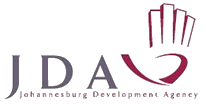The Johannesburg Development Agency (JDA) recorded its most impressive performance yet in the latest financial year, doubling its capital expenditure while receiving a clean financial bill of health from the Auditor-General.
At the same time, the agency raised its black empowerment share of capital spending to 76% of its budget, and its SMME share of operating and capital expenditure to 29% of its budget.
These were among the highlights of the JDA’s 2014/15 annual report, which was released on 28 January as part of the City of Joburg’s integrated annual report.
The JDA was one of six City agencies to receive a clean audit (unqualified, with no findings) from the Auditor-General, while the City overall received an unqualified audit (with some findings).
Speaking at the release of the integrated report, Finance MMC Geoffrey Makhubho said the City was proud of this achievement, and had already put measures in place to address the shortcomings in those departments and agencies identified by the Auditor-General.
“This is a remarkable year for local government,” the MMC said. “We can look back on this period with a considerable sense of achievement when we consider the strides we have made
“Very few of our critics want to be reminded of the fact that Johannesburg teetered on the brink of bankruptcy before the ANC took over the running of Johannesburg at the advent of democracy.”
FOUR UNQUALIFIED AUDITS CAPPED BY A CLEAN AUDIT
The JDA’s clean audit, following unqualified audits in 2011, 2012, 2013 and 2014, capped a successful five-year period for the agency.
The JDA successfully addressed the shortcomings identified by the Auditor-General the previous year (2013-14) – particularly around the issue of payments within 30 days – by implementing stricter controls over invoice management.
Other recommendations – regarding improved non-financial performance controls, supply chain management, IT governance and financial management – were also addressed to the Auditor-General’s satisfaction.
JDA Chief Executive Thanduxolo Mendrew, in his CEO’s report, said there was still room to improve and innovate, “particularly with regard to dealing with project delays and community awareness and consultation”.
Mendrew also announced that the difficulties experienced in formulating and implementing Jozi@Work packages in the JDA’s developments were a thing of the past.
He said the agency was “confident that in the new financial year, we will increase the entity’s provision of Jozi@Work packages to perform at levels exceeding our performance in procuring from and supporting local SMMEs in construction”.
NINETY-EIGHT CAPITAL PROJECTS TO THE VALUE OF R1.46BN
In 2014/15, the JDA implemented 98 capital projects to the value of R1.46-billion, amounting to 87 percent of the R1.68-billion budget for the current financial year.
This was more than double the value of projects implemented in 2013/14, and more than four times the value of projects implemented in 2012/13, and brought the agency’s capital expenditure over the last 13 years to R8.44-billion.
Major drivers of capital expenditure in 2014/15 were the large construction works being undertaken for the Phase 1C expansion of the Rea Vaya bus rapid transit (BRT) network from the CBD to Alexandra and Sandton, and the construction of pedestrian-cycling pathways along the City’s emerging Corridors of Freedom.
Most of the latter projects involved small construction companies, with the result that large-scale infrastructure spending also benefited local businesses and created local job opportunities.
The largest area development projects implemented in 2014/15 were:
- Diepsloot development – R34.3-million
- Nancefield Station precinct – R60-million
- Bruma Lake rehabilitation – R51.5-million
- Park Station precinct – R83-million
- Jabulani node – R65.5-million
- Kazerne property development – R71.5-million
- Westbury development – R65.7-million
2015/16: CORRIDORS OF FREEDOM PROJECTS
Development Planning MMC Roslynn Greeff, in her foreword to the annual report, said the JDA fulfilled an important role in the work needed to achieve the spatial and economic goals set out in the City of Joburg’s 2040 Growth and Development Strategy (GDS).
“The Joburg 2040 GDS is based on transit corridor-oriented spatial development where well-planned transport arteries – Corridors of Freedom – link up mixed-use development nodes with high-density accommodation, supported by office buildings, retail developments and opportunities for education, leisure and recreation,” MMC Greeff said.
“In 2014/15, the JDA continued working towards this vision by developing transport station precincts and investing in public transit and mobility infrastructure along the Corridor routes.”
Chief Executive Mendrew said that ongoing work on Rea Vaya’s Phase 1C trunk route, which will form the backbone of the Louis Botha Avenue Corridor, was one of the JDA’s more important implementation projects for 2015/16, along with the dedicated cycling-pedestrian pathway currently being laid down between Sandton and Alexandra.
Other key Corridors of Freedom projects in 2015/16, Mendrew said, included Park Station precinct in the inner city, the Jabulani node and Nancefield Station precinct in Soweto, developments in the Randburg CBD, and the Rotunda Park precinct in Turffontein.
“The JDA will also be investing a greater amount of time on development facilitation in the Corridors of Freedom projects, and will deepen its engagement with communities and members of the public along the way,” he said.
“This includes introducing public participation in the planning stage, consulting with communities and affected parties during the design stage, and involving community members in projects to allow the project to tell the story of the neighbourhood.”
- Johannesburg Development Agency: Annual Report 2014/15

